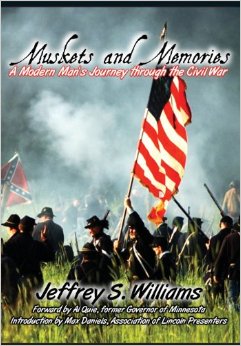The memory of the “Gray Ghost” is strong in Franconia
By James Cullum - Kingstowne Patch
Colonel John Singleton Mosby (Rick Turner) at the Franconia Museum's two-day Civil War Sesquicentennial event at Lee District Rec Center, Sunday, May 15, 2011. Credit James Cullum
The spitting image of Confederate Colonel John Singleton Mosby, one of the most despised and feared men ever to ride in Franconia, appeared in full battle dress at the Lee District Rec. Center. Why? Over the weekend, the Franconia Museumdiscussed the area’s role in the Civil War, and the story is incomplete without including the “Gray Ghost.”
With his hands resting on the butts of his twin Colt pistols, re-enactor Rick Turner talked about one of the most famous figures in Fairfax County’s Civil War heritage. “Other than my weight, my age and the color of my facial hair, I am the spitting image of Mosby,” said Turner, a Great Falls resident. “He was about five-feet-six-and-a-half, and maybe 135 pounds. Small guy. As a matter of fact, a number of Union soldiers who he captured during the war were frequently unimpressed by the rebel chieftain. The legend said he was seven feet tall, with long hair and a 10-foot sword.”
What was the area like back then? “Franconia was occupied by the Union Army from the early part of the Civil war, but the people who live here were southern sympathizers,” said Carl Sell, president of the Rose Hill Civic Association. “Although there were no major battles in Rose Hill, there were a lot of raids, battles and skirmishes. When you put them all together is an interesting story.”
Mosby was given an independent guerilla unit by Confederate General Jeb Stuart a year-and-a half into the war. Their mission: disrupt, attack and harass as many Union camps, outposts and supply trains in Northern Virginia as possible. His most effective weapons were surprise, and coming in blasting with Colt pistols instead of flashing sabers on raids. In 1863, Mosby’s legend spread like wildfire, as he captured Union Brigadier General Edwin Stoughton in a raid at the Fairfax City Courthouse.
The “Gray Ghost” slipped into Lee District with a small group of Confederate guerillas on the evening of September 27, 1863. After finding the mansion of Union-appointed Governor Francis Pierpoint empty, the raiders decided to take Colonel Daniel French Dulany, the governor’s military aide, at the Rose Hill Manor. Riding with Mosby was Dulany’s son, who aided in the capture.
“Mosby was always with his men in the front, and nobody topped him as far as horsemanship and marksmanship with a pistol,” said Turner, who is related to three of Mosby’s riders. “I don’t know how he survived. He was shot in the gut twice. He liked to have young men with him on his raids because, he said, ‘They do anything I tell them, they’re fearless and they have fun.’”
Mosby operated almost exclusively in Fauquier County in an area dubbed “Mosby’s Confederacy”. “He was advanced for his time militarily, and had no military background,” Turner said. “He really developed guerilla warfare.”
After the war, Mosby, a lawyer, became a Lincoln Republican and was the Virginia Presidential campaign manager for Ulysses S. Grant. “The sentiment was that he was a traitor,” Turner said. “My great grandmother lived to be 102, and her father was in the war and rode with Mosby. When I was a little boy she didn’t speak too highly of him. I remember her saying that whenever Mosby was around there was always trouble and that he attracted the Union Calvary to the farms. She was born in 1875, and was around all of those people who had been around in Fauquier County.
“But after the war, he moved on mentally. Grant appointed him U.S. Consul in Hong Kong, and he served in federal positions with the State Department,” Turner said.
Mosby died at 82 in Washington D.C. in 1916, and is buried in Warrenton.

